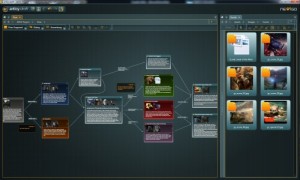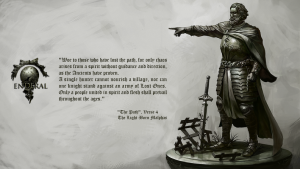 This is the second part of the chat we’ve had with Nicolas Samuel, Project Lead at SureAI. In the previous part, which you can find here, he talked with us about how you can keep up the motivation in a non commercial project and bring it across the finish line. In this next part Nicolas shares with us issues that, in his opinion, went good or bad during development. And he concludes with tips that modders or gamedevs in general should keep in mind, if they want their project to see the light of day.
This is the second part of the chat we’ve had with Nicolas Samuel, Project Lead at SureAI. In the previous part, which you can find here, he talked with us about how you can keep up the motivation in a non commercial project and bring it across the finish line. In this next part Nicolas shares with us issues that, in his opinion, went good or bad during development. And he concludes with tips that modders or gamedevs in general should keep in mind, if they want their project to see the light of day.
Here we go:
THINGS THAT WENT RIGHT & WRONG
Articy: Can you give us examples for things that went absolutely alright and exactly as planned?
Articy: Are there also examples for the other side of the coin? Areas that went horrible wrong while in development?
Nicolas Samuel: We wasted a lot of time on features that should have been nice-to-have to begin with. That was mainly my fault, as I was so invested in them that I wanted to have them at all cost – a good example is the real-time fast traveling system. I think, in the end, we sunk about almost 150 man-hours into it, only to realize that the game would always crash when flying over areas with a big object count. If we were to do everything again, we would definitely prioritize even more.
Articy: Enderal – Shards of Order is complex. Content-wise: Is there anything that didn’t make it in the mod?
Nicolas Samuel: Yeah, definitely. I wrote a small post in our forums about all these stories that didn‘t make it in-game. The biggest loss, in my opinion, was the „Rhalâta“ questline that revolves around the eponymous cult that rules the Undercity, an underground slum below the city of Ark. Also, a lot of quests that would have tied up some loose ends had to be cut – for example, one that allowed the player to participate in an investigation after the murder of an important main character. However, the good news is that there are plans to implement that missing content eventually.
THE WRITING PROCESS
I usually start out with a rough draft, and split them up into individual scenes.
Articy: What is your process of writing such a complex story? Do you start with the main „route“ and then fill the branches?



Articy: What part – writing-wise – do you like the most in Enderal?
Nicolas Samuel: Good question. I think I‘m particularly happy with the main companions, Jespar and Calia, and their personal storylines, as well as with the more morbid/surreal parts of the scripts, such as the dream sequences. Also, I’m happy with the overall feel we created – even though Enderal’s story certainly isn’t perfect, there’s a strong feeling of theme that shows in almost every piece of writing in the game world, from big story missions to idle chatter.
Articy: What are the lessons you’ve learned during the whole project. Anything you like to share with other modders or gamedevs?
Intrinsical motivation is the most powerful asset in creative work.



Finally, working in a production where there was almost no way to extrinsically motivate the people involved (apart from using Enderal as a portfolio project), I learnt that intrinsical motivation is the most powerful asset in creative work. While it was very challenging at times, I was, for example, amazed by the amount of passion some contributors put into their work, especially some of the already high-profile voice actors who had no „rational“ reason to participate in Enderal and who simply helped us because they liked the project and the writing. And while Enderal can absolutely not compete with a true AAA title in terms of overall production value, I think this passion can make up for a lot.
Articy: What’s next for you?
Nicolas Samuel: Next up for me personally are several projects. I‘ve just finished writing the first draft of my Mystey/Horror novel for which I will be looking for a publisher next year. We are also currently planning and working on new content for Enderal, which will be announced soon. As for what comes after that – we will see.
Articy: Thanks a lot for sharing this information with us Nicolas. We wish you a bright future for all your coming projects.
You can find out more on Enderal – Shards of Order on SureAIs website. And also on Facebook & Twitter.
Follow us on Twitter, Facebook and LinkedIn to keep yourself up to date and informed. To exchange ideas and interact with other articy:draft users, join our communities on reddit and discord.
